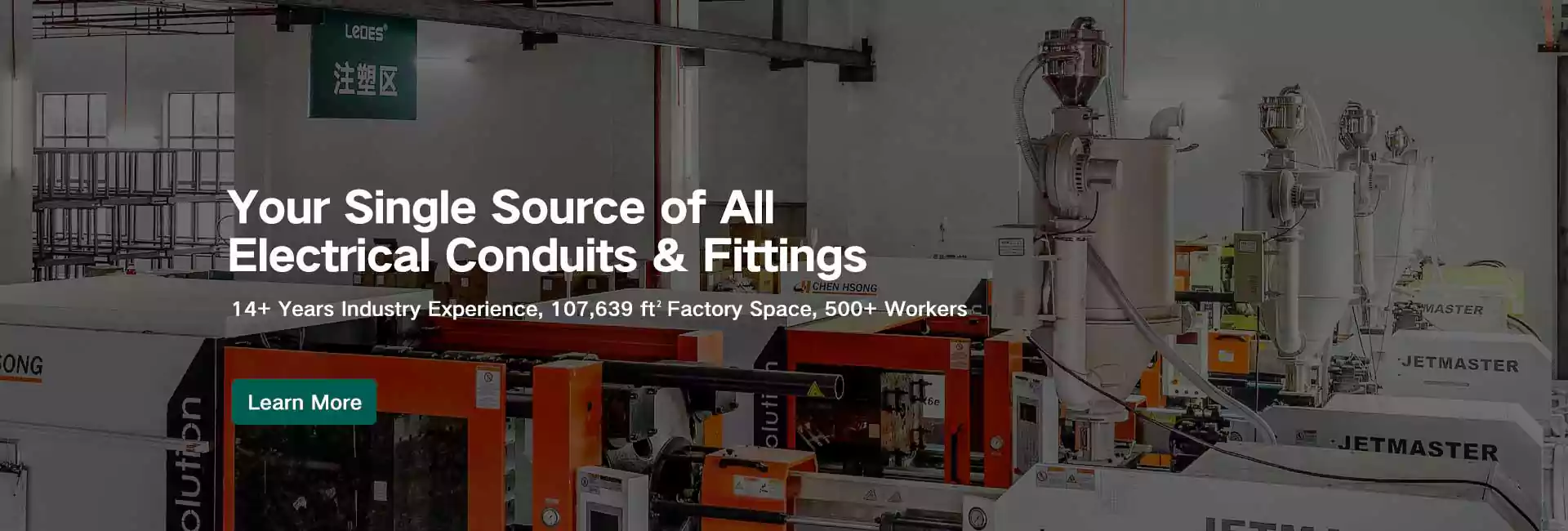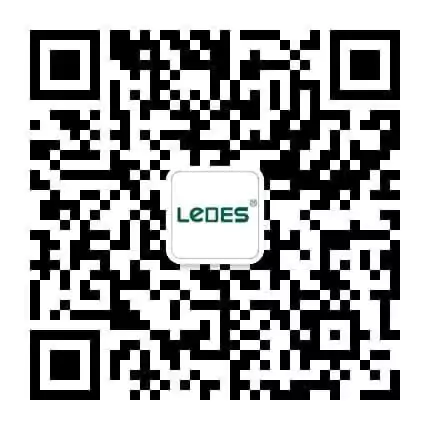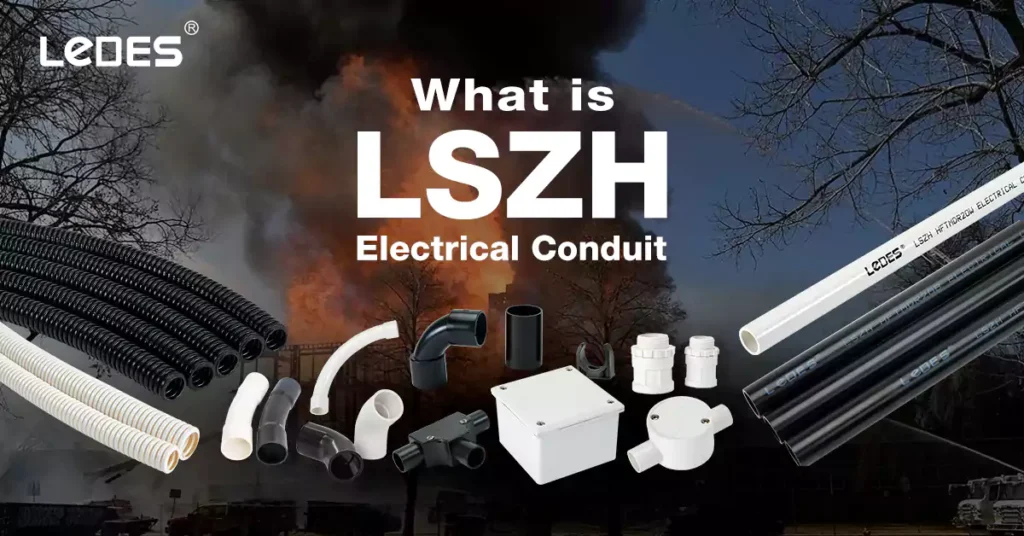
목차
There are more and more people interested and ask about LSZH (Low Smoke Zero Halogen) electrical conduit and accessories. In order to address these queries and provide comprehensive information, we have prepared this article to shed light on the topic.
With increasing environmental concerns and the growing emphasis on safety standards, it has become imperative to upgrade electrical conduit systems to meet the latest requirements. LSZH conduit and accessories offer a viable solution in this regard. In this article, we will delve into the concept of LSZH conduit, its benefits, and its applications, providing you with a comprehensive understanding of this innovative technology.
What is LSZH Conduit?
LSZH conduit, as the name suggests, refers to a type of conduit that is manufactured using materials with low smoke emission and zero halogen content. Unlike traditional PVC (Polyvinyl Chloride) conduits, LSZH conduits are designed to minimize the release of toxic gases and smoke in the event of a fire. This makes them an ideal choice for applications where human safety and environmental protection are paramount.
LSZH, which stands for Low Smoke Zero Halogen, offers significant advantages by greatly reducing the emission of black smoke and halogens during combustion. This not only makes it more environmentally friendly but also enhances safety.
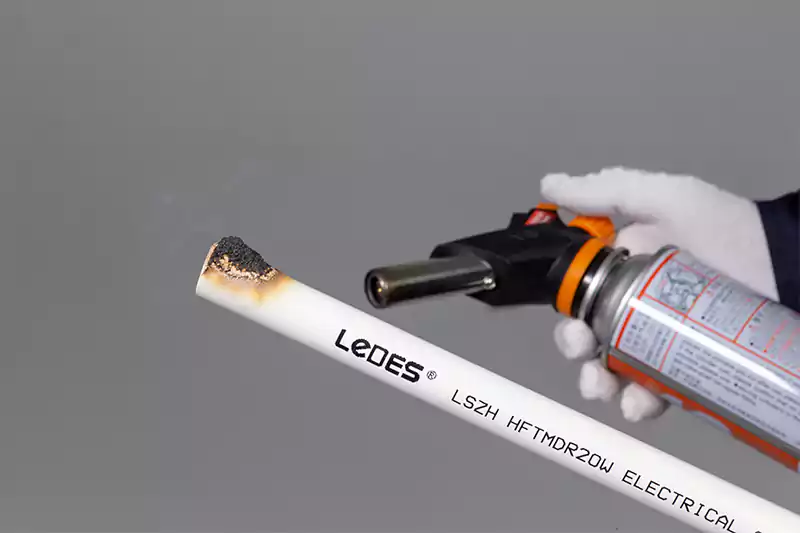
It is well known that halogens are toxic gases, and excessive inhalation can lead to poisoning. In the context of fire rescue operations, minimizing the inhalation of toxic gases by trapped individuals increases their chances of survival. Additionally, the large amount of black smoke generated by traditional pipes during combustion can make rescue efforts more challenging. This is where the low smoke and zero halogen characteristics of LSZH pipes prove advantageous.
The terms LSOH, HFFR (Halogen Free Fire Retardant) and NHFR (Non Halogenated Fire Retardant) are often used interchangeably.
Table of Abbreviations for Low Smoke Zero Halogen Conduits
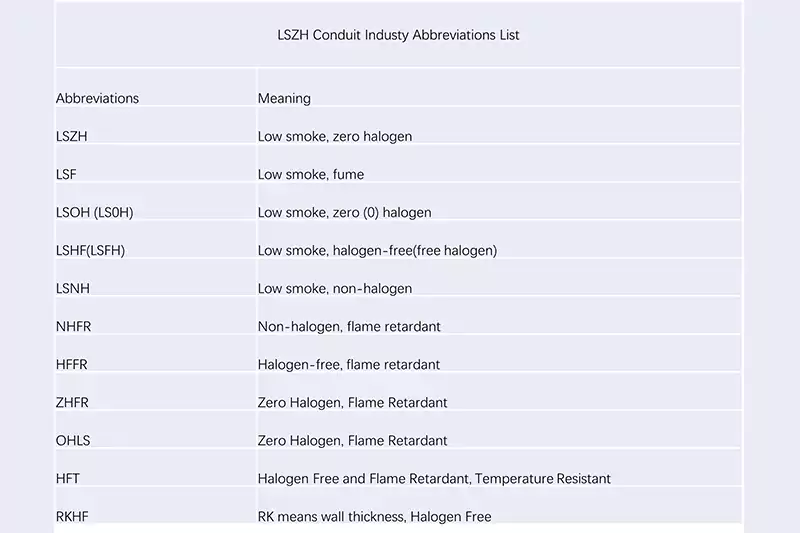
Standards of Low Smoke Halogen Free Conduit
Low Smoke Zero Halogen (LSZH) conduit pipes are subject to different standards and requirements in various countries. Let’s take a look at the examples of North America and Australia to illustrate this.
North America:
UL1685-4 and IEC 60754-1
These are the two primary standards, but there are also other standards such as ETL verified, IEEE-1202, and NFPA-130. Let’s take IEC 60754-1:2011 as an example, which provides detailed requirements for sample selection, cleaning, test procedures, and result evaluation. It evaluates the smoke content and presence of halogens in the samples under test conditions using chemical or physical methods. The testing includes blank tests, material tests, halogen acid content calculation, among others. Therefore, products that have undergone these tests are 100% compliant in terms of quality.
It is important to note that the outer diameter dimensions in North America may slightly differ from those in other countries, as they are measured in inches. The commonly used sizes range from 1/2 inch to 8 inches. Here are some information of Ledes low smoke halogen free conduit, for more, please click the link here.
Australia:
Main standards:
IEC61386-1, IEC61386-21
Other related standards:
EN50267-2, IEC60754-1
IEC61034-2, ASTM E662
ISO4589-2, ISO19700, UL94
Low Smoke Zero Halogen (LSZH) products have gained widespread application in Australia and other countries such as Chile and Peru. Not only conduits but also cables are being promoted for broader adoption in LSZH materials.
As a result, there are multiple relevant standards, which are listed on our LSZH conduit page. You can click here to view the related products.
In Australia, comprehensive testing is conducted for LSZH product series. Taking IEC 61386-1:2021 as an example, it encompasses general tests (specifications), physical performance tests (tensile strength, insulation properties), fire rating tests, and more. It can be said that the testing is quite extensive.
In other relevant EN or IEC standards, we can observe requirements for pH value (mainly testing Halogen Free properties), Oxygen Index, and detailed testing for Low Smoke as outlined in ASTM E662. This comprehensive testing process examines the raw materials, formulations, and manufacturing processes. If you are interested in this aspect, you can contact our customer service team for more details.
Lastly, it is important to note that Australia, unlike North America, typically uses millimeters (mm) as the unit of measurement. The mainstream dimensions range from 20mm to 150mm, catering to the needs of most everyday construction projects.
LSZH Conduit Vs. PVC Conduit, What's Difference?
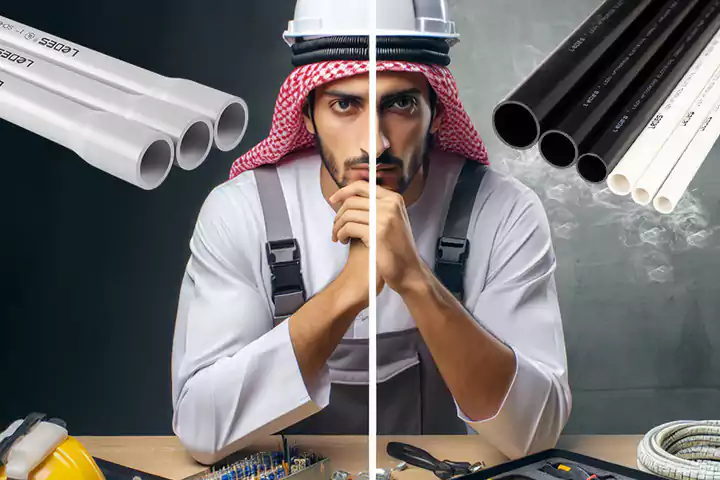
To understand the differences between LSZH conduit and PVC 도관, it’s important to first consider their material characteristics. While both are plastic pipes, there are several distinctions between them:
1. 재료 구성
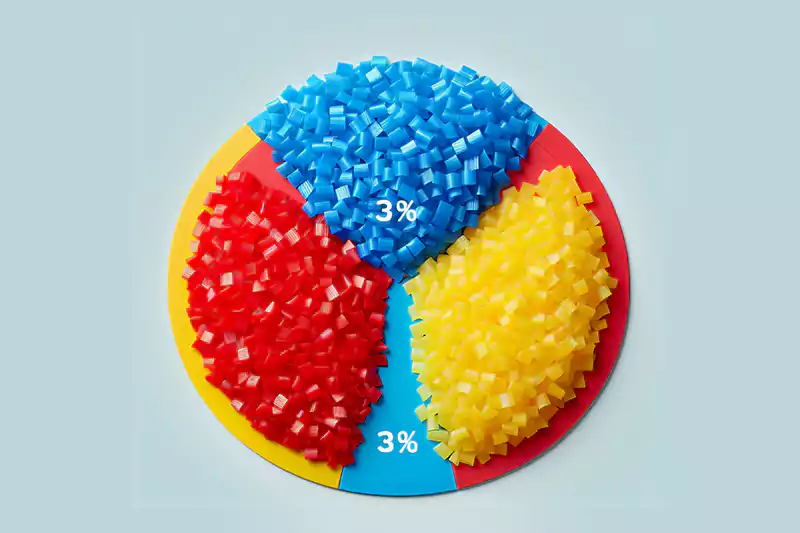
PVC conduit is typically made from polyvinyl chloride, a thermoplastic polymer derived directly from petroleum or similar products. On the other hand, LSZH conduit incorporates inorganic material fillers into a thermoplastic matrix. For example, aluminum trihydrate (ALTH) is added to the appropriate thermoplastic base to suppress fire and form char, thereby reducing the emission of toxic gases, smoke, and carbon particles while maintaining the required electrical insulation and physical performance for the intended application. The preferred flame-retardant inorganic filler is still aluminum trihydrate (ALTH). In the event of a fire, this material undergoes an endothermic chemical reaction, absorbing heat and releasing steam. Importantly, the decomposition of the polymer carrying the filler occurs at approximately the same temperature. The steam disrupts the combustion of outgassing, aiding in the formation of a char layer that protects the remaining material and captures particulates. The high filler content (around 60%) also replaces a significant portion of the base polymer, reducing the overall fuel available for combustion.
Based on these material properties and composition differences, LSZH conduit significantly reduces the emission of toxic gases and carbon particles compared to PVC. Through its endothermic chemical reaction during combustion, it helps to lower smoke generation, making it more environmentally friendly and safe.
2. Different Formulation in Manufacturing Process

As mentioned earlier, the material characteristics of LSZH conduit require a different additive formulation during the manufacturing process. Compared to PVC conduit, there are limitations on the additives used in LSZH conduit production. This is because the addition of different additives may have an impact on its physical or chemical properties, including its low smoke characteristics and overall product quality stability. Therefore, strict adherence to relevant processes and ensuring the quality of additives is crucial in the manufacturing process. Additionally, the price of additives for LSZH conduit is typically 2-3 times higher than that of PVC conduit.
3. Different Physical Performance
Due to the differences in raw materials and manufacturing processes, LSZH conduit exhibits better physical performance compared to regular PVC conduit. For conduits with the same wall thickness, LSZH conduit is over 30% lighter in weight than PVC conduit while having a higher strength of 15%-20%.
Taking heavy-duty LSZH conduit as an example, its maximum resistance to compression and impact is 1,250Nt/5cm and 6J, respectively. This increased durability of LSZH conduit after installation leads to cost reduction and improved longevity.
4. Low Smoke & Halogen-Free
As mentioned earlier, the key advantage of LSZH conduit over PVC conduit is its ability to significantly reduce the release of black smoke and toxic gases during combustion. This makes it particularly advantageous in building projects with high safety requirements, such as schools, hospitals, government buildings, residential complexes, and large supermarkets. LSZH conduit provides a safer performance even under extreme conditions.
5. Wider Operating Temperature Range
While PVC conduit can withstand temperatures ranging from -25°C to 100°C (-13°F to 212°F), LSZH conduit has a higher temperature limit of -45°C to 150°C (-49°F to 302°F). This significant difference indicates that LSZH conduit offers improved temperature resistance, making it more suitable for outdoor and underground installations. The enhanced temperature tolerance ensures that the conduit is less prone to cracking and damage during use.
6. Improved UV Resistance
Thanks to continuous improvements and upgrades in the formulation, the Ledes low smoke and halogen-free product series has significantly enhanced UV resistance. These products have demonstrated excellent performance in hundreds of hours of continuous UV testing. This ensures that the low smoke and halogen-free conduit and accessories have better longevity when used in outdoor installations, helping our customers save on future maintenance costs.
7. Higher Fire Ratings
Although both PVC and LSZH conduits adhere to UL94 standards, the low smoke and halogen-free conduit requires higher fire ratings. For example, Ledes’ low smoke and halogen-free products fully comply with the highest UL94 classification, V0. You can compare the differences between various UL94 ratings to understand their significance.
The higher fire ratings offer obvious benefits. If the fire source is cut off immediately, the LSZH conduit can self-extinguish in a shorter time. For example, the UL94V-0 standard requires extinguishing within 10 seconds, but Ledes’ products go further by achieving a 5-second rating. This reduces the generation of flames, dense smoke, and toxic gases, providing more time for rescue efforts.
8. Higher Cost:
Due to the differences in manufacturing processes and additives compared to PVC conduit, the low smoke and halogen-free product series incurs higher manufacturing costs.
LSZH Conduit Vs. PVC Pipe, What's Difference?
In reality, many people confuse LSZH conduit, PVC conduit, and PVC pipe, thinking that they can be interchangeable. This is actually an incorrect notion.
Essentially, LSZH conduit and PVC conduit belong to the same category of conduits as they are both used for electrical wiring applications, with the difference lying in their material composition, as we have explained in detail earlier. Therefore, I won’t repeat it here. On the other hand, PVC pipe, especially white PVC pipe, is specifically designed for drainage, sewage, or water purposes. Apart from sharing the same raw material as PVC conduit, they differ in terms of additives, physical properties, and testing standards.
In terms of design purpose, both LSZH conduit and PVC conduit are used for cable protection. Therefore, their design focuses on physical performance, resistance to UV or sunlight exposure, and, if buried underground, considerations for water absorption and resistance to underground bacteria. In the design and manufacturing process, they incorporate additional additives to enhance specific performance aspects and ensure long-term cable protection.
In contrast, PVC pipe primarily considers its internal compressive strength. Its main purpose is to ensure smooth water flow without any damage within the designated pressure range. Consequently, its required physical properties are notably different.
As pipe distributors are well aware of these distinctions, how can ordinary consumers differentiate between them? It’s actually quite simple. By examining the imprints on the pipe wall, one can discern the differences. Reputable manufacturers or brand producers usually clearly label the product specifications, model, name, certification standards, and temperature information on the pipe. By carefully observing the pipe wall, one can easily identify the distinctions.
Therefore, LSZH conduit or PVC conduit should not be mixed with white PVC pipe as their performances are completely different, and mixing them may pose risks.
The Benefits of LSZH Conduit and fittings?
Based on the information provided, readers should have a clear understanding of the advantages of low smoke and halogen-free conduit and accessories. Here is a summary:
1. Environmental Friendly
Low smoke and halogen-free conduit and accessories are made from materials that suppress the generation of black smoke and do not contain halogens or significant amounts of harmful gases. As a result, they are more environmentally friendly during installation and use.
2. Lightweight
LSZH conduit is more than 30% lighter than PVC conduit of the same size. This weight reduction translates to significant cost savings in installation and maintenance. Additionally, the lightweight nature of the product contributes to cost savings during transportation, indirectly reducing carbon emissions and environmental pollution.
3. Enhanced Safety
Compared to PVC conduit, LSZH conduit significantly reduces the production of black smoke and minimizes the release of toxic gases during combustion. It also offers higher fire ratings and a wider operating temperature range, making it suitable for normal operation in extreme environments (e.g., cable protection in areas with large temperature differences, such as deserts).
LSZH Conduit Application
Due to their excellent performance and lightweight design, low smoke and halogen-free conduit and accessories can be used in a wide range of scenarios. Here are some examples:
● Schools and Hospitals

In schools and hospitals, where sensitive populations such as students or patients are present, there is a higher demand for environmental and building material standards. Using superior electrical conduit products can help improve the environment and safety in these settings. Ledes has been involved in various projects in this sector. For instance, in the Hospital Project in the outlying islands of Macau, contractors have consistently chosen Ledes’ low smoke and halogen-free conduit and accessories due to their commitment to creating a highly safe and secure hospital environment. The products have received positive feedback since the initial phase.
● Hotels

High-end hotels prioritize the use of high-quality building materials, which is understandable. Ledes has been favored by contractors in projects such as the Holiday Villa Hotel in Malaysia. They provided the second-generation low smoke and halogen-free conduit and accessories, contributing to the successful completion of the project and providing enhanced safety measures for the hotel.
● Subways
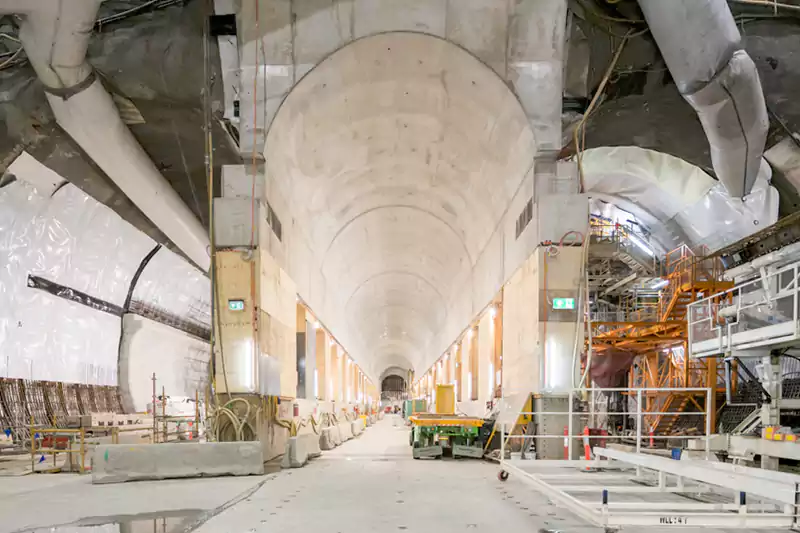
Subways are underground structures with higher humidity levels compared to aboveground environments. Additionally, subway operations rely on high-voltage electricity. Inadequate protection measures can lead to serious safety incidents and significant losses. In the Melbourne Metro Project in Australia, Ledes’ designed low smoke and halogen-free conduit and accessories gained favor with the Australian government. After rigorous testing and verification, they were successfully applied to the project, ensuring the safety of this vital subway hub in Australia.
● Pharmaceutical Companies
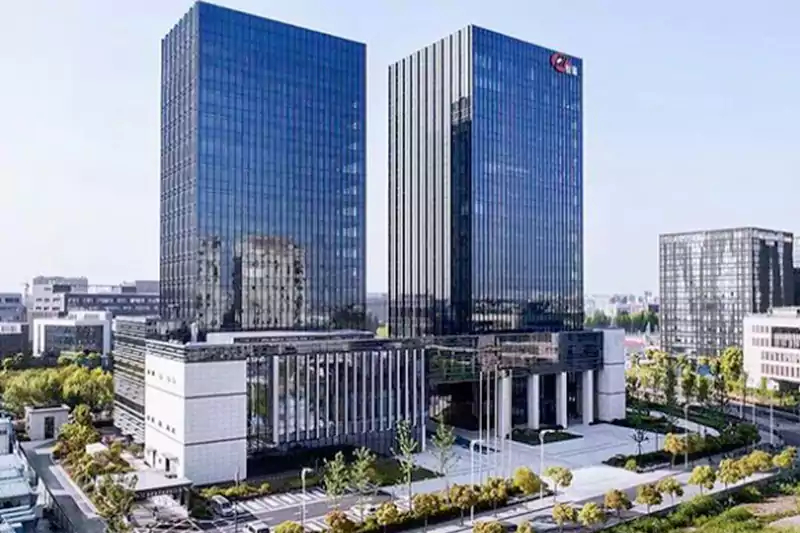
Pharmaceutical Company, Hengrui Pharma, a leading pharmaceutical companies in China, ranked the 21st out of the top 1000 global pharma firms in 2020, also chose Ledes Low Smoke Halogen Free conduits and fittings for its building construction.
These are just a few examples, and Ledes has been involved in various projects across different industries. If you would like more detailed information about the projects Ledes has participated in, please contact our business manager.
Moreover, the low smoke and halogen-free conduit and accessories can be used in many other scenarios, including:
- Residential buildings
- Theaters or large public venues
- Data centers, telecommunications, and network equipment connections and cable protection
- Elevator and power plant facilities and cable protection
- Outdoor cable protection for solar power plants
- Cable protection for new energy electric vehicles and related products
Common LSZH Conduit and Fittings
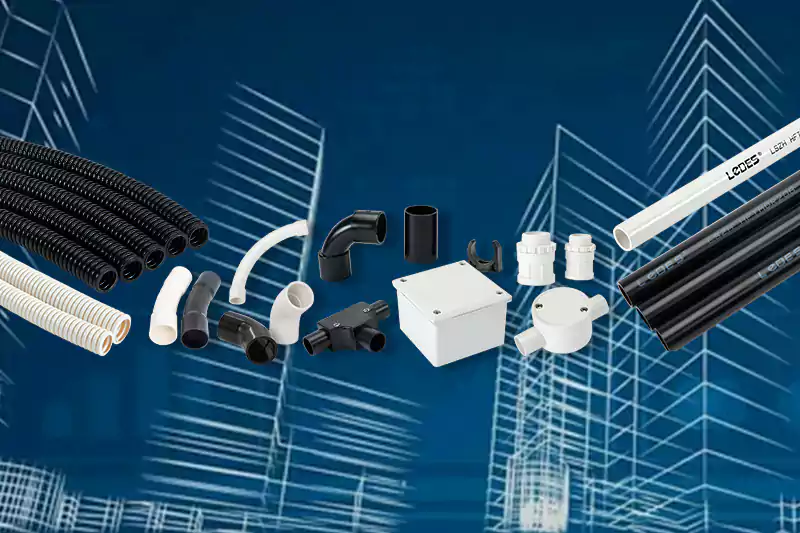
Currently, the low-smoke halogen-free series of conduits and accessories are basically consistent with PVC conduit. And Ledes is also being continuously updated. The main conduit types and accessories are as follows:
- LSZH Rigid Conduit (Medium Duty & Heavy Duty)
●LSZH Corrugated Flexible Conduit (Medium Duty & Heavy Duty)
●LSZH Communications Conduit (Medium Duty & Heavy Duty)
●LSZH Schedule 40 & 80 Rigid Electrical Conduit Pipe
●LSZH Flexible ENT Conduit
●LSZH Electrical Box
●LSZH Adaptable Boxes
●LSZH Junction Boxes
●LSZH Conduit Bend
●LSZH Conduit Elbow
●LSZH Conduit Clamp
●LSZH Conduit Adaptor
●LSZH Conduit Inspection Tee
●LSZH Conduit Coupling
If you need a catalog of Ledes’ LSZH conduit and fittings, you can download it from the download center. For the latest product information, you can click here to contact our business manager.
How to Choose a Low Smoke Zero Halogen Conduit Supplier?

Because low-smoke halogen-free conduits and accessories have many advantages, many companies have begun to invest in research and development and independently manufacture low-smoke halogen-free products. We have listed the following 5 points to help you choose the right supplier.
1. Certification
As mentioned in the second chapter of this article, there are different standards for low-smoke halogen-free conduits and accessories in North America or Australia. So before choosing a supplier, you need to confirm whether they meet the local certification standards. This is very important!
If your supplier’s products do not meet the local certification standards, they may not pass the acceptance after construction, causing significant losses. In addition, if the products used in construction do not pass the local certification standards, once a safety accident occurs, the accountability of the contractor and the builder will be affected.
Therefore, we recommend that you must choose a certified and qualified supplier to ensure that your project proceeds normally.
2. Product Quality
In addition to looking for certified suppliers, it is well known that the various parameters of the certification also have a range of values, namely the minimum and maximum values. If the minimum value of the certification standard can be reached, it can be regarded as certified.
Why do we mention these? Because Ledes’ brand concept has always been to make the best products, we have been updating and iterating technology to achieve the highest value. For example, we mentioned the fire rating before. Ledes’ products have reached the highest level UL94V-0. Generally speaking, the more demanding the supplier is for product quality, the stronger its R&D capabilities are, and the better the quality of the product is.
Of course, before the supplier ships or after you receive the goods, you can also entrust a third-party agency to test to see whether it meets the supplier’s nominal parameters. This can also protect your rights and interests to the greatest extent.
At the same time, better product quality can ensure that the product is used for a longer time, which saves you costs in the long run. Suppose we compare a group of unqualified products with excellent products. It may be cheaper in the initial purchase of unqualified products, saving procurement costs. However, once a problem occurs later, it will cost several times more (labor, purchase of new materials, etc.) to solve the problem. So from this perspective, the unit price of high-quality products is slightly higher, but it saves you considerable costs later, which is undoubtedly more cost-effective.
3. Supplier Reliability
Whether a supplier is reliable or not includes many dimensions. For example, whether the product is delivered on time, whether the pre-sales and after-sales service of the product is good, etc.
For brands or wholesalers looking for factories, the reliability of suppliers is often reflected in some added value. For example, the supplier’s professionalism in the product, the degree of understanding of the target market, and whether it can provide relevant value to customers. The higher the professionalism of the product, the better it can help customers to carry out market promotion in the early stage or even when the business expands, and produce products that are 100% in line with the target market. The more suppliers know about the target market, the more feasible suggestions they can provide to customers based on the standard updates of the target market or market changes, so as to help customers sell products and achieve a win-win situation.
Of course, other services such as pre-sales and after-sales services are basic services, and most suppliers can do it.
4. Price
When it comes to price, generally many buyers can directly see the purchase price. But as mentioned in the second point, if our suppliers can provide high-quality products, then can products with substandard quality but low prices definitely save you costs?
Most of our customers understand this truth. Because LSZH pipes and fittings are building materials, once installed, the cost of removal and maintenance is very high, especially in countries with high labor costs. Therefore, purchasing high-quality products that meet local certification standards may seem to cost more in the early stage, but it is almost maintenance-free in the later stage, and you don’t need to pay extra costs. Even if there are some unexpected situations, you can discuss with the supplier how to solve the problem reasonably.
5. Brand
Compared with various regional or international industry brands on the market, I think most dealers have contact.
But if you want to find a long-term cooperative brand and get a stable supply and competitive price, it is better to cooperate with a manufacturer brand, such as Ledes. The essence of a manufacturer brand is actually a factory. The factory itself has R&D, production and sales teams, and is more adept at product R&D and manufacturing. However, in addition to the marketing content that everyone sees, the manufacturer brand generally has a series of product certifications, as well as a deep understanding of various markets and countries, which can help our customers do business in the target country.
If you are a regional dealer or brand distributor, you might as well try to understand us and get more information and support.
연락하다
In conclusion, low smoke and halogen-free conduits are environmentally friendly products with numerous advantages for various construction and electrical projects. They are ideal choice for many applications which require high safety requirements.
If you have any further questions or requirements, please feel free to submit a form 또는 send us an email. We are here to assist you.
FAQs
What does LSZH conduit stand for?
LSZH stands for Low Smoke Zero Halogen. This means that in the event of a fire, the material emits minimal smoke and does not release halogen gases. This is important in environments where toxic fumes must be minimized for safety.
The flame retardant raw material of LSZH conduit is aluminum trihydrate filled into the pipe, and this material absorbs heat energy and releases steam when encountering heat, thus achieving a low smoke effect. The material itself, because a new generation of composite additives is added, can reduce the smoke generated during combustion, making it more environmentally friendly.
Is LSZH better than PVC?
Yes, at least In many applications, especially where fire safety is critical. LSZH is preferred over PVC. While PVC (Polyvinyl Chloride) is widely used due to its cost-effectiveness and durability, it produces significant toxic and corrosive halogen gases when burned. LSZH, on the other hand, reduces these risks by emitting very little smoke and no halogen, making it a safer option in public buildings, schools, transportation systems, and data centers.
Can PVC be Low Smoke Zero Halogen?
No, PVC cannot be classified as LSZH. By its nature, PVC contains chlorine, which means it will release halogen compounds during combustion. LSZH materials are formulated specifically to avoid halogen content, so standard PVC does not meet LSZH criteria.
Moreover, PVC has worse high and low-temperature performance than LSZH Conduit; that is, the temperature limit it can withstand is lower, so its safety and reliability are not as good as LSZH conduit under extreme conditions.
What are the benefits of LSZH?
There are 4 benefits for LSZH conduit,
- Enhanced Fire Safety: In a fire, LSZH materials emit minimal smoke and no toxic halogen gases, reducing hazards for occupants and first responders. Moreover, PVC can withstand a lower temperature threshold than LSZH Conduit, so its safety and reliability are not as good as LSZH Conduit under extreme conditions.
PVC conduit working temperature: -15℃ to +105℃ (-5℉ to 221℉)
LSZH conduit working temperature: -45 to +150℃ (-49℉ to 302℉)
- Improved Visibility & Evacuation: Low smoke production helps maintain visibility during emergencies, aiding in evacuation and reducing panic. This can increase precious rescue time for firefighters and thus improve the survival rate.
- Equipment Protection: The absence of corrosive halogen gases helps protect sensitive electronic equipment and infrastructure. Because LSZH conduit has better performance (such as impact resistance and stiffness, etc.), it undoubtedly provides better protection for electrical equipment.
- 규정 준수: Many modern safety standards and building regulations favor or require LSZH in public and high-occupancy spaces.
For example, countries such as Chile and Peru have used the performance of low-smoke halogen-free ducts as a reference, requiring that duct products for new buildings must meet the standards before normal construction and acceptance.
What is HFT conduit?
HFT conduit actually has three meanings: Halogen Free, Fire Resistant and Temperature Stability. This is actually the same product as LSZH conduit, but it is an abbreviation of the three major characteristics of LSZH conduit.
What is a LSZH conduit used for?
LSZH conduits are primarily used in applications where fire safety and minimal toxic emissions are paramount. Common uses include:
- Public Buildings & Transport Hubs: Airports, train stations, and shopping centers
- Data Centers & Hospitals: Where sensitive equipment or life-critical operations are in place
- Schools. Applied in schools, it can better protect the safety of children during their studies. This can be said to be one of the classic applications of LSZH conduit.
- Underground and Confined Spaces: Tunnels, subways, solar power and other areas where smoke accumulation poses a major risk
What is the difference between PVC and Low Smoke Zero Halogen?
In short, there are four differences between the two:
- 재료 구성: PVC is a chlorine-based polymer, while LSZH materials are formulated without halogens.
- Combustion Behavior: When burned, PVC releases toxic halogenated gases and heavy smoke, whereas LSZH materials produce very little smoke and no halogen gases.
- Application Requirements: LSZH is typically mandated in areas with stringent fire safety requirements, whereas PVC might be used where such strict standards aren’t enforced.
- Formulation in Manufacturing Process. As a LSZH conduit manufacturer, we clearly know that the production materials, formulas and even processes of LSZH conduit and ordinary PVC pipe are different. This is because LSZH conduit has characteristics that PVC conduit does not have.
How about LSZH conduit price?
LSZH conduits generally command a slightly higher price compared to standard PVC conduits. This is due to the specialized materials and manufacturing processes involved. However, the investment is often justified by the improved safety features and compliance with modern fire regulations. Pricing can vary based on factors such as:
- Material costs and production volumes
- Certification and regulatory requirements
- Local market conditions and specific application needs

